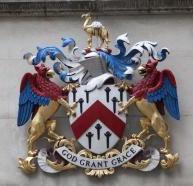His full name was Abū Ḥāmid bin Abū Bakr Ibrāhīm. Born to a chemist, he was highly educated and became a pharmacist ("Attar" means "apothecary"), in which profession he attended to numerous patients. His patients would confide their troubles in him, which affected him deeply. Abandoning his profession, he traveled widely, meeting many people but especially Sufi philosophers, finally returning to his home town of Nishapur where he promoted Sufism, a religious practice found within Islam which is characterized by a focus on Islamic purification, spirituality, ritualism, and asceticism.
(By the way, Nishapur produced another famous Persian poet I have talked about in this blog, who died not many years prior to Attar's birth: Omar Khayyam.)
Attar wrote lyrical poems representing Islamic mysticism, biographies of famous Muslim mystics, and a few philosophical works. Although mentioned by contemporaries, he was not well-known in his lifetime, but some of his works survived so that they could be promoted in the 15th century. It is possible that he was "discovered" because of a comment by Rumi:
"Attar was the spirit,Sanai his eyes twain,And in time thereafter,Came we in their train."
In another poem, Rumi wrote:
Attar travelled through all the seven cities of loveWhile I am only at the bend of the first alley.
The ideas infused in Attar's poetry reflect Sufi ideas: the soul is bound to the body and awaits its release to return to the source of spirit. This reunion can be attained in this life through purification and asceticism. He draws on many older works and history to explain his ideas.
In April 1221, Mongols invaded and slaughtered many in Nishapur, including the 78-year-old Attar. A mausoleum in Nishapur was built in the 16th century (pictured above is the mausoleum after a 1940 renovation).
His most famous poem is called (in English) The Conference of the Birds. I'd like to share it with you tomorrow.


